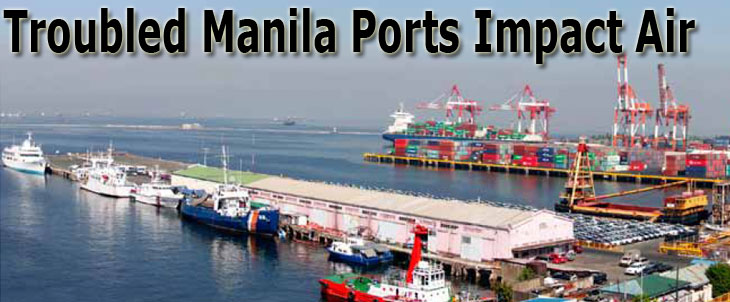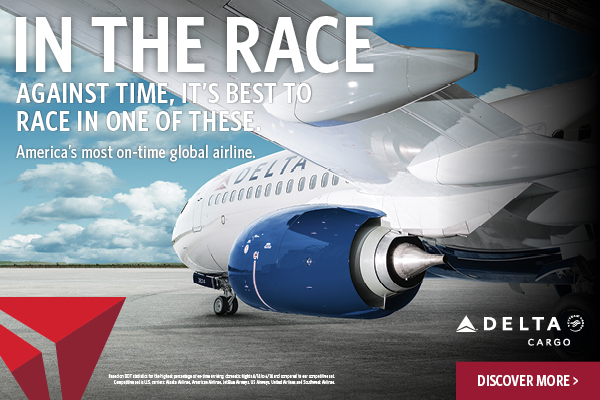
As FlyingTypers
reported last year, the U.S. West Coast stand-off between employers and
unions, which caused so much disruption, proved a positive boon to air
cargo markets, especially on Trans-Pacific lanes. But the U.S. was not
the only country to suffer port congestion and shipping delays that prompted
modal shifts.
In Asia, port congestion at Hong Kong and
seasonal and weather disruption at ports in Korea, China, and Vietnam
all had an impact on air cargo markets. But it was the Philippines where
modal shift was most marked. The port of Manila, gateway to the Philippines,
suffered a perfect storm of troubles during 2014 and this had immediate
benefits for many in the air freight sector, while also having a tangible
impact on pricing.
A trucking ban in Metro Manila between February
and September caused chaos, which was then confounded by a surge in imports
in the second half. This caused overloaded roads and trucking networks
to become even more congested, resulting in a huge build up of empty and
laden boxes at the port. Even in the final week of 2014, waiting times
for vessels were sometimes as high as 10 days at the port’s main
container terminals, while box dwell times fluctuated at 10-18 days. Port
delays have now eased, in part due to a seasonal lull in imports, but
many fear that any increase in demand could see port delays cause supply
chain chaos again.
 Paul
Tsui, chairman of the Hong Kong Association of Freight Forwarding and
Logistics, said port congestion in Manila was a major factor for Asia
supply chain providers for much of 2014 and remained a concern. Paul
Tsui, chairman of the Hong Kong Association of Freight Forwarding and
Logistics, said port congestion in Manila was a major factor for Asia
supply chain providers for much of 2014 and remained a concern.
“The current situation is very serious
and on top of the port congestion on the U.S. West Coast, it makes the
situation worse,” he said. “Air freight rates out of Manila
have jumped through the roof, and just before the Chinese New Year until
the first week after the holiday almost all carriers were only accepting
shipments at premium rates.
Tsui said for exports to the U.S., shipments
currently needed to be tendered two weeks in advance, illustrating “how
port issues affect both import and export for Philippines.”
Another major forwarder based in Manila
said it was still possible to charge premiums for shipments to and from
the Philippines in the early months of March for air freight. “Backlogs
at Manila port have fallen, but there are still delays and for urgent
shipments air cargo is the best option,” he added.
 Stephen Ly, formerly managing director,
DHL Global Forwarding Philippines and now DHL’s Managing Director
for Singapore, said although ocean congestion at Manila had started to
clear, many companies including DHL had benefited from the modal shift
from ocean to air as shippers sought to avoid port congestion and supply
chain delays.
Stephen Ly, formerly managing director,
DHL Global Forwarding Philippines and now DHL’s Managing Director
for Singapore, said although ocean congestion at Manila had started to
clear, many companies including DHL had benefited from the modal shift
from ocean to air as shippers sought to avoid port congestion and supply
chain delays.
While DGF has access to the company’s
nightly express freighter network services into Hong Kong from the Philippines,
for the most part during the worst of the congestion in 2014, commercial
bellyhold capacity was used to meet the supply chain needs of clients.
“But bellyhold capacity was getting
full,” explained Ly. “Imagine a 40-ft. container converted
to air freight. That’s a lot of volume. So this led to a lot of
aircraft charters in Q3 and Q4 of 2014.”
Ly said port congestion had caused problems
both for inbound raw materials, semi-finished goods, and fully processed
exports.
“This led to a record number of freighter
charters for the consumer and many manufacturing industries,” he
said.
“We’ve also done five or six
charters this year. This was mainly due to public holidays, the papal
visit at the start of the year that saw roads closed, and the Chinese
New Year holidays.”
SkyKing |






